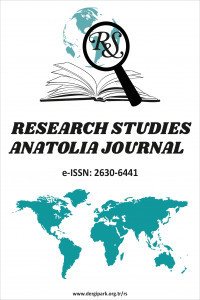PSİKOLOJİ ÖĞRENCİLERİNİN GENİŞ PERSPEKTİFTE BÖLÜM SEÇME SÜRECİ
Kariyer seçimi insan ömrünün çok önemli bir parçasıdır. Literatürde değişik meslek gruplarıyla birçok kariyer seçimi çalışması yapılmıştır. Bu çalışmada, araştırmacılar psikoloji bölümü seçimini etkileyen etkenleri geniş bir perspektifte incelemiştir. Önce, onların ortak noktalarını, motivasyonlarını, bilişsel ve bağlamsal etkenlerini derinden anlamaya çalışmış; sonra, bölüm (kariyer) seçme sürecini çocukluktan başlayıp hayat boyu süren bir süreç olarak ele almışlardır. Yarı-yapılandırılmış mülakatlar ve çizim görevleri, 9 psikoloji birinci sınıf öğrencisine uygulanmıştır. Tematik analizden sonra 5 ana tema ortaya çıkmıştır. Araştırmacılar muhtemel etkenleri şöyle gruplamışlardır; dört tanesi (amaca yönelik, bağlamsal, karakteristik sebepler ve alternatif seçenekler) karar vermeyi doğrudan etkilerken bir tanesinin (süreçle ilgili deneyimler) karar vermeyi dolaylı olarak etkilediği vurgulanmıştır. Psikoloji öğrencilerinin genel kişilik özellikleri çoğunlukla başarı arayan, çalışkan, yardımsever ve sorun çözücüdür. Çoğu içe dönüktür ve sessiz bir çocukluk yaşamıştır. Ayrıca, psikolojiyi bilen insanların ve okul danışmanlarının psikolojiyi önerdiği bulunmuştur.
Anahtar Kelimeler:
Kariyer Seçimi, Psikoloji Bölümü, Nitel Çalışma, Psikoloji Öğrencileri, Fenomenoloji
Department Choice Process of Psychology Students in Wide Perspective
Career decision is very important in human life. So many career decision making studies were conducted in various occupational groups. However most of these studies include limited perspectives from different occupational groups and none of them includes psychology department specifically. In this study, researchers investigate underlying factors related to decision of the psychology department in a wide perspective. Firstly, researchers try to understand deeply their common points, motivations, cognitive, and contextual factors. Secondly, researchers consider department (career) choice as a process, which begins in their childhood; persist through their life-span. Semi-structured interviews and drawing tasks were used in this study with nine psychology juniors. After the thematic analysis, 5 main themes were found. Researchers modeled probable factors as, four of the main themes (goal-directed, contextual and, characteristic reasons, and alternative choices) directly affect decision making but one of them, which is process related experiences affects indirectly the decision itself. Psychology students’ general personality features are mostly achievement seeker, hardworking, helpful and problem solver, most of them are introverted and had a somewhat quiet childhood. Also, people who know about psychology, counselors of schools, suggest psychology whereas people who do not know about psychology, school teachers, and relatives, suggest law and even contempt psychology.
Keywords:
Career Decision, Psychology Department, Qualitative Study, Psychology Students, Phenomenology,
___
- Akbayır, K., (2003).Öğretmenlik mesleğine yönelmede ailenin ve branş seçiminde cinsiyetin rolü. Retrieved from 12.05.2012 http://infobank.fedu.odtu.edu.tr/ufbmek5/netscape/b_kitabi/PDF/OgretmenYetistirme/Bildiri/t271d.pdf
- Bahar, H. H. (2002). Eğitim fakültesi, tıp fakültesi ve iktisadi ve idari bilimler fakültesi öğrencilerinin bazı sosyo-ekonomik özellikleri ile fakülte tercihleri arasindaki ilişki. Erzincan Eğitim Fakültesi Dergisi, 4(1), 125-144
- Clutter, C. (2010). The effects of parental influence on their children’s career choices. Postgraduate dissertation. Kansas State University, Manhattan.
- Elwood, R. H. (1927). The role of personality traits in selecting a career: The nurse and the college girl. Journal of Applied Psychology, 11(3), 199-201.
- Erden, M., (1995). Öğretmen adaylarının öğretmenlik derslerine yönelik tutumları, Eğitim Fakültesi Dergisi, 11, 99-104.
- Gati, I., Krausz, M., & Osipow, S. H. (1996). A taxonomy of difficulties in career decision making.Journal of Counseling Psychology, 43(4), 510-526.
- Ginzberg, E., Ginsburg, S. W., Axelrad, S., & Herma, J. R. (1951). Occupational choice: An approach to a general theory. Columbia University Press. New York.
- Hargrove, B.K., Creagh, M.G., B.L., & Burgess B.L. (2002). Family interaction patterns as predictors of vocational identity and career decision-making self-efficacy. Journal of Vocational Behavior, 61, 185-201.
- Holland, J. L. (1985), Making Vocational Choices, 2nd edn, Englewood Cliffs NJ:Prentice Hall.
- Korkut Owen, F. (2008). Mesleki seçimleri etkileyen ana etmenler,(R. Özyürek Ed). Kariyer Yolculuğu,(ss.1-23), Ankara
- Korkut-Owen, F. (2012).Mersin Üniversitesi Eğitim Fakültesi Dergisi, (8)3, pp.135-151.
- Korkut-Owen, F., Kepir D., Özdemir S., Ulaş Ö., Yılmaz O. (2012) Mersin University Journal of the Faculty of Education, 8(3), 135-151.
- Kuzgun, Y. (2004). Meslek rehberliği ve danışmanlığına giriş. Ankara: Nobel Yayın Dağıtım.
- Lent, R.W., Brown, S.D., Talleyrand, R., McPartland, E.B., Davis, T., Chopra, S.B., Alexander, M.S., Suthakaran, V., Chia-May Chai (2002). Career choice barriers, supports, and coping strategies: College students’ experiences. Journal of Vocational Behavior, 60(1), 61-72
- Lease, S.H. (2004). Effect of locus of control, work knowledge, and mentoring on career decision making difficulties: Testing the role of race and academic institution. Journal of Career Assessment, 12(3), 239-254.
- Lunneborg, P. W. (1978). Sex and career decision-making styles. Journal of Counseling Psychology, 25(4), 299-305.
- Moustakas, Clark E. (1994) Phenomenological research methods /Thousand Oaks, Calif. : Sage.
- Savickas,M.L.(1991).The meaning of work and love:career issues and interventions. Career Development Quarterly, 39, 315-324.
- Yayın Aralığı: Yılda 4 Sayı
- Başlangıç: 2018
- Yayıncı: Arif YILDIZ
Sayıdaki Diğer Makaleler
TÜRK TV DİZİLERİNDEKİ KARAKTERLERLE KURULAN İLİŞKİNİN DOĞASINI ANLAMAK
Emine Zehra KASAP, Feyza AĞZITEMİZ, Necla KIZIL, Ahmet YILDIRIM
SÜRDÜRÜLEBİLİR REKABETİN ANAHTARI: ENDÜSTRİYEL TASARIM
Burkay ERGÖREN, Taner AŞÇI, Adnan AKKURT
YAPISAL ANLAMDA TÜRKİYE KİŞİSEL VERİLERİ KORUMA KURUMU’NA İLİŞKİN BİR DEĞERLENDİRME
1940’LI YILLARDA TÜRKİYE’DE ENTELİJANSİYA, BASIN VE SİYASET İLİŞKİSİ ÜZERİNE
KUYUMCU MAĞAZALARINDA FİZİKSEL ÇEVRE KALİTESİNİN RİSK ALGISINA ETKİSİ
İbrahim Halil KORKMAZ, Aydın Can TAŞKESEN, Cihan ÇETİNKAYA
5302 SAYILI YASANIN YERELLEŞME BAĞLAMINDA DEĞERLENDİRİLMESİ
